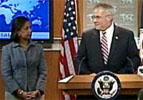
There were important statements out yesterday from two of the administration’s most pivotal actors on Sudan policy, U.N. Ambassador Susan Rice and Special Envoy Scott Gration. There is great deal of interesting material in both statements, but the comments are most striking in their sheer, sharp, and ultimately disconcerting contrast.
Rice’s comments, coming as she emerged from a meeting of the Sanctions committee on Sudan, are blessedly forthright. Citing “major and frequent violations of U.N. sanctions on Sudan,” Rice stated simply:
“We know that weapons continue to flow into Darfur, acts of sexual and gender-based violence continue unabated and with impunity, military over-flights and offensive actions continue. And though there has been the recent signing of the framework agreement, the fact is we continue to receive reports of offensive military actions by the Government of Sudan in Darfur. If these reports are true, this behavior does not suggest a new willingness on the part of Sudan to fully engage in the peace process.”
Rice also noted the importance of having rebel groups observe the sanctions. Rice expressed clear frustration that the Sanctions committee was failing to take tougher action despite these repeated violation of the arms embargo and the findings of the Group of Experts to that effect.
The special envoy’s press conference made Sudan sound like a very different place. Special Envoy Gration referred to the recent agreement between the Government of Sudan and the Justice an Equality Movement as a “landmark” agreement – despite the fact that talks appear to be falling apart in part because the government offensive cited by Ambassador Rice continues in Darfur. Along the same lines, Gration maintained, “The framework that was signed between JEM and the Government of Sudan offers us an important opportunity to significantly reduce violence in Darfur” without mentioning the Sudanese government attacks in Darfur that have claimed hundreds of lives in recent weeks. He also failed to mention the corrosive effect of the government attacks or their civilian toll when asked about the difficulties of getting other rebel groups to sign on to agreements or in keeping JEM at the table.
When asked directly how he felt about the administration’s balance of pressures and incentives in dealing with President Bashir, Gration offered this in response:
“Well, certainly, it’s the responsibility of the government to provide security, to bring development to its people, to ensure that the Millennium Development Goals are turned into reality, that people have water, that they have food security, that they have gender equality and transportation, communications, and those issues. So certainly, we are going to be working and using pressures and incentives to make sure this takes place.”
It strikes me as incredibly odd that on the same day we have Ambassador Rice rightly noting that Bashir’s “behavior does not suggest a new willingness on the part of Sudan to fully engage in the peace process,” the special envoy is discussing the need to have a government led by a wanted war criminal achieve its Millennium Development Goals.
It seems clear that the Deputies Committee meeting on Sudan failed to produce a clear verdict on the direction of Sudan policy or the balance between incentives and pressures the administration should use in dealing with Sudan. As yesterday’s dueling statements made obvious, the administration needs to start singing from a common songsheet and hold President Bashir accountable for facts on the ground as it said it would when the Sudan policy review was first rolled out.
Photo: U.S. Ambassador to the U.N. Susan Rice and Special Envoy Scott Gration at the launch of the U.S. policy on Sudan (State Dept.)

